Financial News
Hillenbrand’s (NYSE:HI) Q3 Sales Top Estimates But Full-Year Sales Guidance Misses Expectations

Industrial processing equipment and solutions provider Hillenbrand (NYSE: HI) announced better-than-expected revenue in Q3 CY2024, with sales up 9.8% year on year to $837.6 million. On the other hand, next quarter’s revenue guidance of $695 million was less impressive, coming in 7% below analysts’ estimates. Its non-GAAP profit of $1.01 per share was 9.3% above analysts’ consensus estimates.
Is now the time to buy Hillenbrand? Find out by accessing our full research report, it’s free.
Hillenbrand (HI) Q3 CY2024 Highlights:
- Revenue: $837.6 million vs analyst estimates of $793.3 million (5.6% beat)
- Adjusted EPS: $1.01 vs analyst estimates of $0.63 (9.3% beat)
- Adjusted EBITDA: $143.8 million vs analyst estimates of $135.2 million (6.3% beat)
- Management’s revenue guidance for the upcoming financial year 2025 is $3.01 billion at the midpoint, missing analyst estimates by 2.7% and implying -5.5% growth (vs 12.8% in FY2024)
- Adjusted EPS guidance for the upcoming financial year 2025 is $2.97 at the midpoint, missing analyst estimates by 3.4%
- EBITDA guidance for the upcoming financial year 2025 is $470 million at the midpoint, below analyst estimates of $485.6 million
- Gross Margin (GAAP): 34.4%, down from 35.5% in the same quarter last year
- Operating Margin: 11.4%, down from 15.5% in the same quarter last year
- EBITDA Margin: 17.2%, up from 12.6% in the same quarter last year
- Market Capitalization: $2.16 billion
"As we've completed our first full year as a pure-play global industrial company, we remain confident in the capabilities of our leading brands and differentiated technologies to deliver world-class solutions for our customers," said Kim Ryan, President and Chief Executive Officer of Hillenbrand.
Company Overview
Hillenbrand, Inc. (NYSE: HI) is an industrial company that designs, manufactures, and sells highly engineered processing equipment and solutions for various industries.
General Industrial Machinery
Automation that increases efficiency and connected equipment that collects analyzable data have been trending, creating new demand for general industrial machinery companies. Those who innovate and create digitized solutions can spur sales and speed up replacement cycles, but all general industrial machinery companies are still at the whim of economic cycles. Consumer spending and interest rates, for example, can greatly impact the industrial production that drives demand for these companies’ offerings.
Sales Growth
A company’s long-term performance can give signals about its business quality. Even a bad business can shine for one or two quarters, but a top-tier one grows for years. Luckily, Hillenbrand’s sales grew at an impressive 12% compounded annual growth rate over the last five years. Its growth beat the average industrials company and shows its offerings resonate with customers.
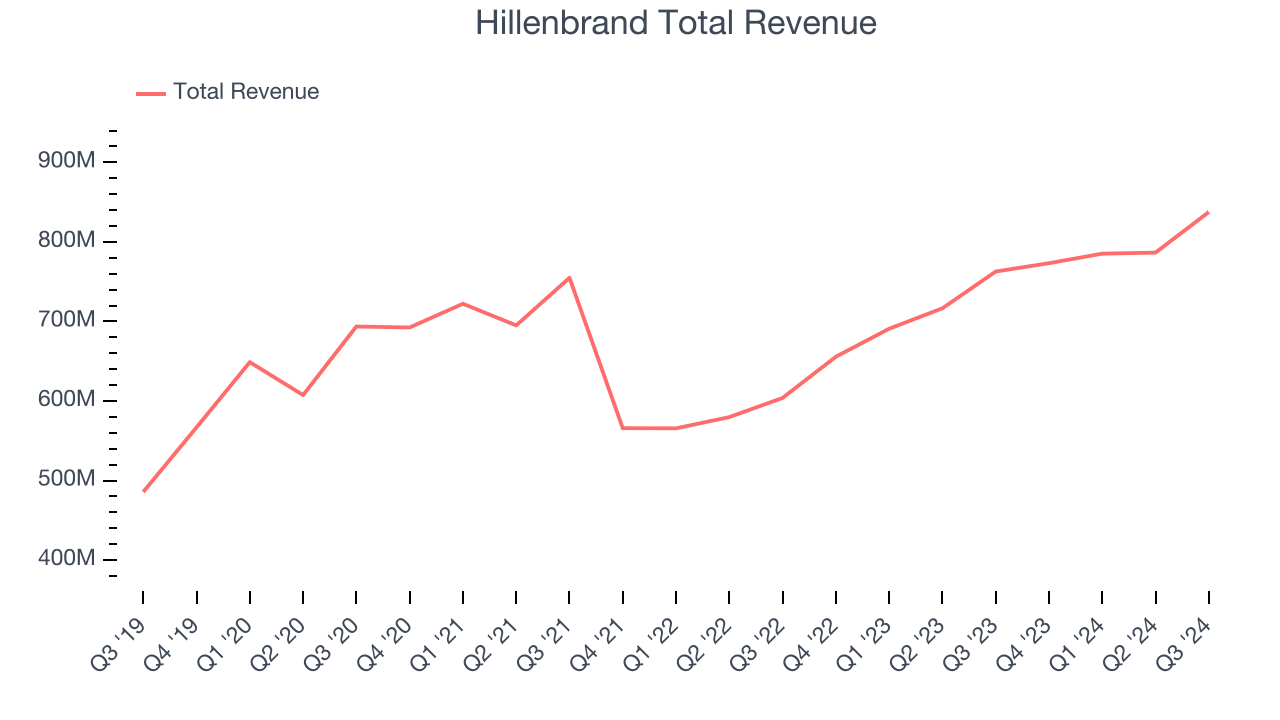
We at StockStory place the most emphasis on long-term growth, but within industrials, a half-decade historical view may miss cycles, industry trends, or a company capitalizing on catalysts such as a new contract win or a successful product line. Hillenbrand’s annualized revenue growth of 17.2% over the last two years is above its five-year trend, suggesting its demand was strong and recently accelerated. 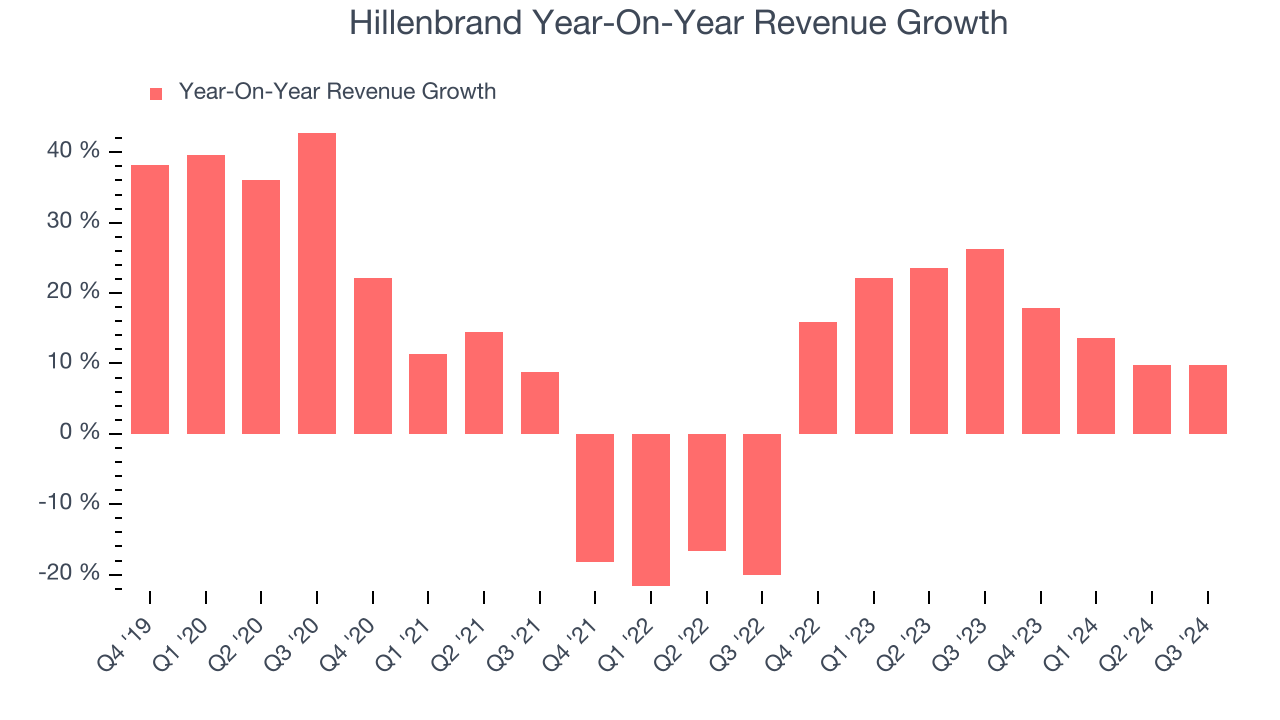
This quarter, Hillenbrand reported year-on-year revenue growth of 9.8%, and its $837.6 million of revenue exceeded Wall Street’s estimates by 5.6%. Company management is currently guiding for a 10.1% year-on-year decline next quarter.
Looking further ahead, sell-side analysts expect revenue to decline 2.1% over the next 12 months, a deceleration versus the last two years. This projection doesn't excite us and suggests its products and services will face some demand challenges.
Today’s young investors won’t have read the timeless lessons in Gorilla Game: Picking Winners In High Technology because it was written more than 20 years ago when Microsoft and Apple were first establishing their supremacy. But if we apply the same principles, then enterprise software stocks leveraging their own generative AI capabilities may well be the Gorillas of the future. So, in that spirit, we are excited to present our Special Free Report on a profitable, fast-growing enterprise software stock that is already riding the automation wave and looking to catch the generative AI next.
Operating Margin
Hillenbrand has been an optimally-run company over the last five years. It was one of the more profitable businesses in the industrials sector, boasting an average operating margin of 12.8%. This result isn’t too surprising as its gross margin gives it a favorable starting point.
Looking at the trend in its profitability, Hillenbrand’s annual operating margin decreased by 2.3 percentage points over the last five years. Even though its historical margin is high, shareholders will want to see Hillenbrand become more profitable in the future.
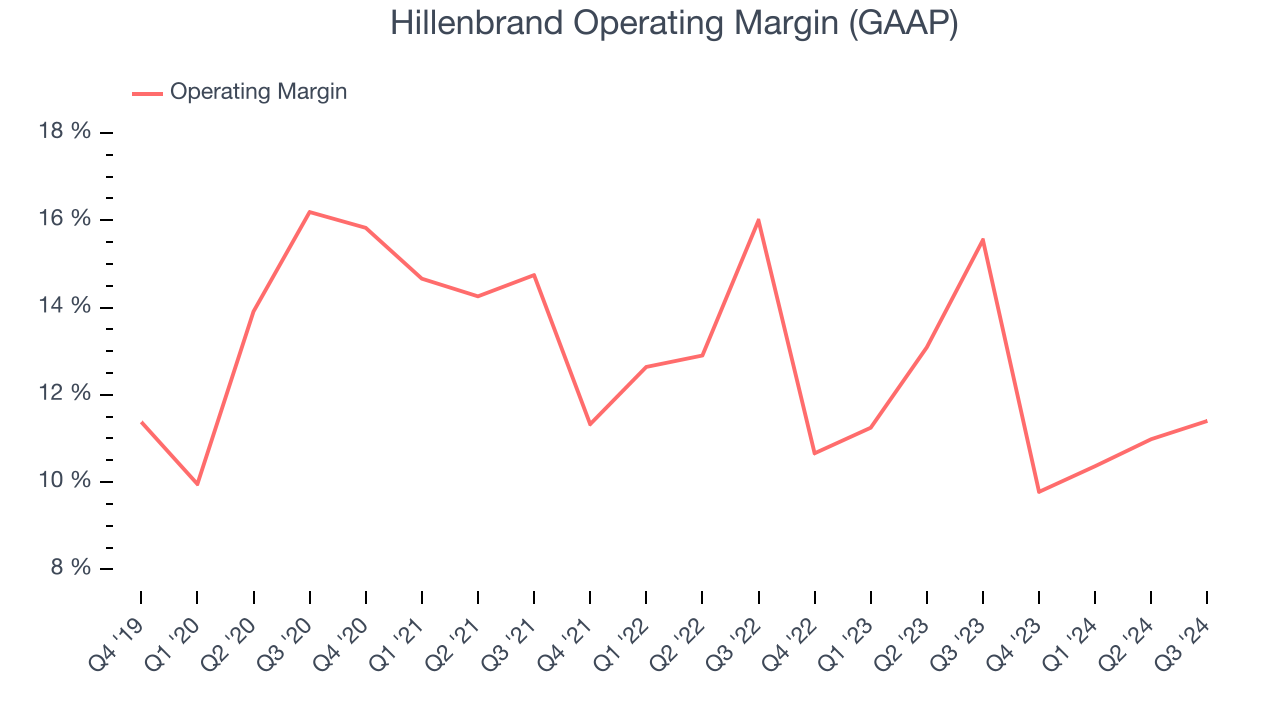
This quarter, Hillenbrand generated an operating profit margin of 11.4%, down 4.1 percentage points year on year. Since Hillenbrand’s operating margin decreased more than its gross margin, we can assume it was recently less efficient because expenses such as marketing, R&D, and administrative overhead increased.
Earnings Per Share
Analyzing revenue trends tells us about a company’s historical growth, but the long-term change in its earnings per share (EPS) points to the profitability of that growth – for example, a company could inflate its sales through excessive spending on advertising and promotions.
Hillenbrand’s EPS grew at an unimpressive 6.2% compounded annual growth rate over the last five years, lower than its 12% annualized revenue growth. This tells us the company became less profitable on a per-share basis as it expanded.
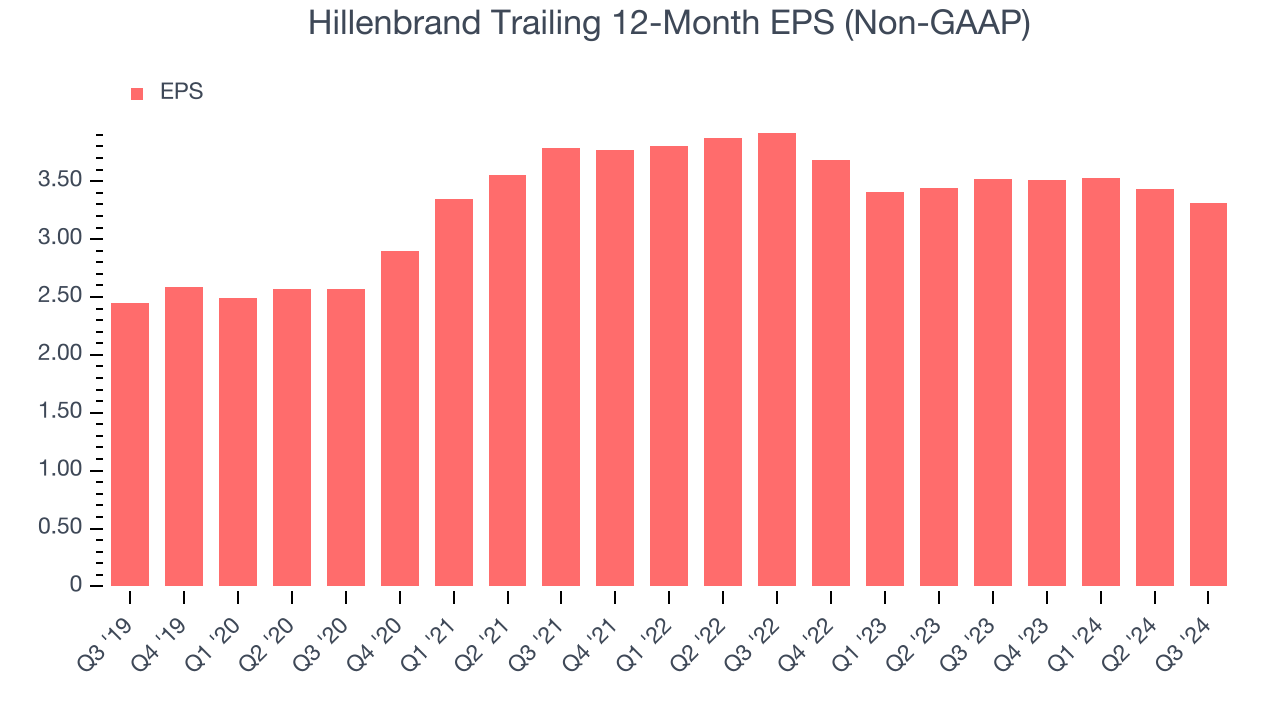
Diving into the nuances of Hillenbrand’s earnings can give us a better understanding of its performance. As we mentioned earlier, Hillenbrand’s operating margin declined by 2.3 percentage points over the last five years. Its share count also grew by 11.7%, meaning the company not only became less efficient with its operating expenses but also diluted its shareholders. 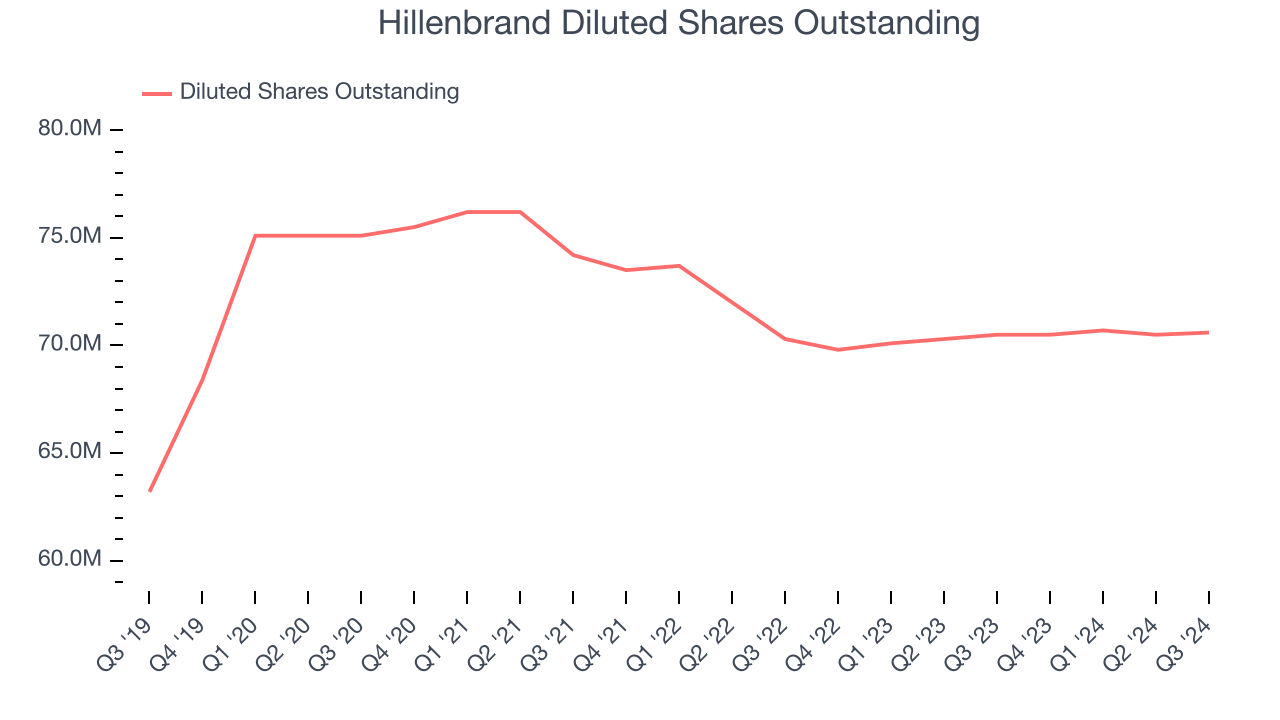
Like with revenue, we analyze EPS over a more recent period because it can give insight into an emerging theme or development for the business.
For Hillenbrand, its two-year annual EPS declines of 8.1% show it’s continued to underperform. These results were bad no matter how you slice the data.In Q3, Hillenbrand reported EPS at $1.01, down from $1.13 in the same quarter last year. Despite falling year on year, this print beat analysts’ estimates by 9.3%. Over the next 12 months, Wall Street expects Hillenbrand’s full-year EPS of $3.31 to shrink by 6.9%.
Key Takeaways from Hillenbrand’s Q3 Results
We were impressed by how significantly Hillenbrand blew past analysts’ revenue expectations this quarter. We were also glad its EBITDA outperformed Wall Street’s estimates. On the other hand, its full-year EPS guidance missed significantly and its revenue guidance for next quarter fell meaningfully short of Wall Street’s estimates. Overall, this was a softer quarter. The stock traded down 4.3% to $28.90 immediately after reporting.
Hillenbrand didn’t show it’s best hand this quarter, but does that create an opportunity to buy the stock right now? What happened in the latest quarter matters, but not as much as longer-term business quality and valuation, when deciding whether to invest in this stock. We cover that in our actionable full research report which you can read here, it’s free.
More News
View More




Recent Quotes
View MoreQuotes delayed at least 20 minutes.
By accessing this page, you agree to the Privacy Policy and Terms Of Service.



